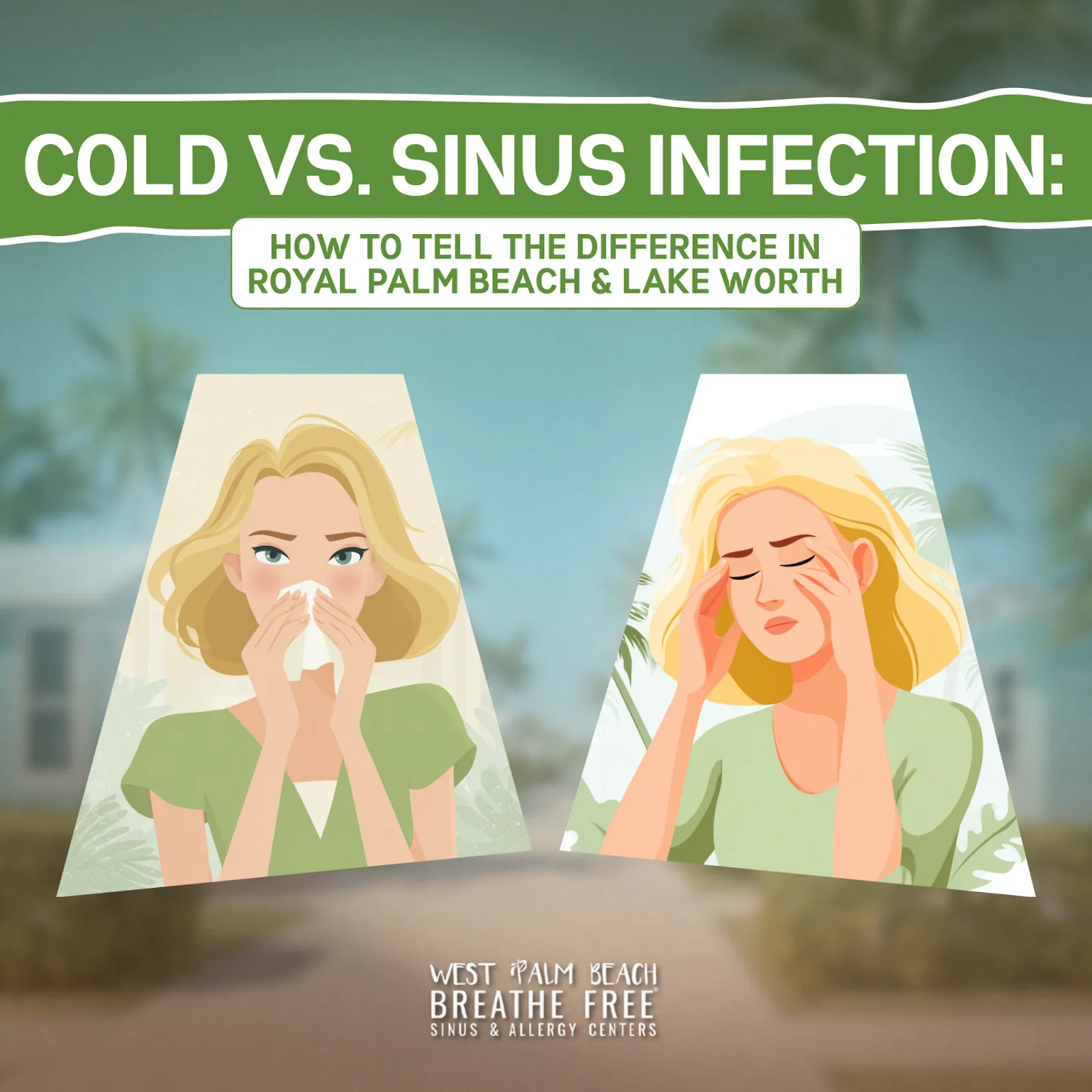.webp)
Cold vs. Sinus Infection: How to Tell the Difference in Royal Palm Beach & Lake Worth
Runny nose, stuffy head, sore throat—it can be hard to know whether you’re fighting a simple cold or dealing with a sinus infection. For residents of Royal Palm Beach and Lake Worth, warm, moist air and high humidity can contribute to conditions that may aggravate sinus irritation. At West Palm Beach Breathe Free Sinus & Allergy Centers, we help patients understand these differences so they can get the right treatment at the right time.

Why the Confusion Happens
Colds and sinus infections share many of the same symptoms, including congestion, facial pressure, and fatigue. This overlap often leads people to treat them the same way, which can delay proper care. In Florida’s climate, allergies and humidity can also contribute to ongoing symptoms, making the line between the two even blurrier.
Knowing the key differences can help you decide whether to ride it out with home care or schedule an ENT consultation in West Palm Beach.
Key Differences Between a Cold and a Sinus Infection
While both conditions affect your nasal passages, their causes are different. Colds are caused by viruses and usually resolve within 7–10 days. Sinus infections, or sinusitis, can be viral or bacterial and may require treatment if symptoms linger or worsen.
Common cold symptoms include:
- Runny or stuffy nose with clear mucus at first
- Sneezing and mild sore throat
- Fatigue that improves as symptoms ease
Sinus infection symptoms may include:
- Thick, yellow or green nasal discharge
- Facial pain or pressure that worsens when bending over
- Symptoms lasting more than 10 days or improving, then returning worse
If your symptoms are dragging on past the 10-day mark, it’s worth getting checked for a Lake Worth sinus infection.
How Climate in Royal Palm Beach and Lake Worth Plays a Role
The warm, moist air in South Florida can actually encourage sinus inflammation. High humidity can increase mold growth, and seasonal allergens like grass and tree pollen can keep nasal passages irritated. This ongoing irritation makes it easier for bacteria to take hold, turning a lingering cold into a sinus infection.
Keeping an eye on local pollen counts and reducing exposure to mold can help lower your risk of developing sinus issues in the first place.
At-Home Care for a Cold
If you’re dealing with a cold, the best medicine is often rest and hydration. Over-the-counter pain relievers can help with headaches or sore throat, and saline sprays can soothe nasal passages.
A few more simple steps include:
- Stay hydrated: Water helps thin mucus, making it easier to drain.
- Use a humidifier: Moist air can ease congestion and prevent dryness.
- Limit irritants: Avoid smoke, strong scents, and dusty environments while you recover.
Most colds clear up in a week, so if yours isn’t improving, it’s time to reassess.
When It’s More Than a Cold
A sinus infection may start out feeling like a cold but lingers or gets worse instead of better. Some bacterial sinus infections may require prescription treatment, especially if symptoms don’t improve on their own. Untreated sinus infections may increase the risk of recurring symptoms or prolonged discomfort in some patients.
You should consider scheduling an ENT consultation if you have:
- Persistent facial pain or pressure
- Nasal discharge that changes color and thickens
- Fever along with congestion
- Recurring infections several times a year
An ENT can determine whether medication, in-office procedures, or other treatments are needed to keep symptoms from coming back.
Get Relief with West Palm Beach Breathe Free
Knowing the difference between a cold and a sinus infection helps you choose the right care sooner. For those in Royal Palm Beach and Lake Worth, climate factors can make sinus issues more frequent, but you don’t have to let them disrupt your life.
West Palm Beach Breathe Free Sinus & Allergy Centers offers diagnosis and treatment options tailored to Florida residents. If you’re unsure whether you’re dealing with a cold or sinus infection, we can help you find answers and discuss treatment options that may provide relief.
The information provided in this article is for informational and educational purposes only and does not constitute medical advice. It is not intended to diagnose, treat, cure, or prevent any disease or medical condition. Always seek the guidance of your physician or other qualified healthcare provider with any questions you may have regarding a medical condition or treatment.
Results may vary: Treatment outcomes and health experiences may differ based on individual medical history, condition severity, and response to care.
Emergency Notice: If you are experiencing a medical emergency, call 911 or seek immediate medical attention.


